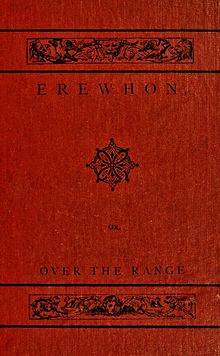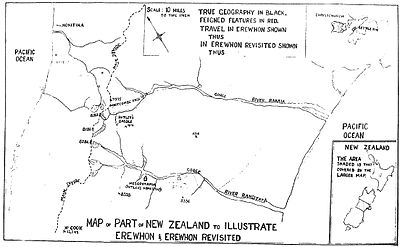
Back Erewhon German Erevono Esperanto Erewhon Spanish اروون Persian Erewhon French Erewhon Italian 에레혼 Korean Erewhon SIMPLE Идукін, або за межею Ukrainian
 First edition cover | |
| Author | Samuel Butler |
|---|---|
| Language | English |
| Genre | Satire, Science fiction[1] |
| Publisher | Trübner and Ballantyne |
Publication date | 1872 |
| Publication place | United Kingdom |
| Pages | 246 |
| OCLC | 2735354 |
| 823.8 | |
| LC Class | PR4349.B7 E7 1872 c. 1 |
| Followed by | Erewhon Revisited |
| Text | Erewhon online |

Erewhon: or, Over the Range (/ɛrɛhwɒn/[2]) is a novel by English writer Samuel Butler, first published anonymously in 1872,[3] set in a fictional country discovered and explored by the protagonist. The book is a satire on Victorian society.[4]
The first few chapters of the novel dealing with the discovery of Erewhon are based on Butler's own experiences in New Zealand, where, as a young man, he worked as a sheep farmer on Mesopotamia Station for four years (1860–1864), exploring parts of the interior of the South Island and writing about it in his A First Year in Canterbury Settlement (1863).
The novel is one of the first to explore ideas of artificial intelligence, as influenced by Darwin's recently published On the Origin of Species (1859) and the machines developed out of the Industrial Revolution (late 18th to early 19th centuries). Specifically, it concerns itself, in the three-chapter "Book of the Machines", with the potentially dangerous ideas of machine consciousness and self-replicating machines.
- ^ Canavan, Gerry (2018). The Cambridge History of Science Fiction. Cambridge University Press. pp. 57, 76–77. ISBN 978-1-31-669437-4
- ^ The title itself is an anagram of the word "nowhere." In the preface to the first edition of his book, Butler specified that "The Author wishes it to be understood that Erewhon is pronounced as a word of three syllables, all short—thus, Ĕ-rĕ-whŏn." Nevertheless, the word is occasionally pronounced with two syllables as "air-hwun" or "air-one".
- ^ Erewhon, or Over the Range (1st ed.). London: Trubner & Co. 1872. Retrieved 5 March 2016 – via Internet Archive.
- ^ George Orwell, Erewhon, BBC Home Service, Talks for Schools, 8 June 1945